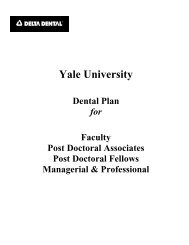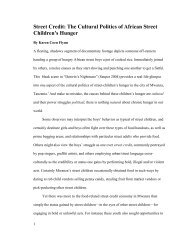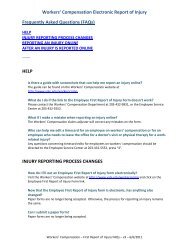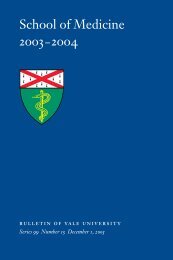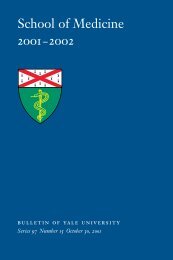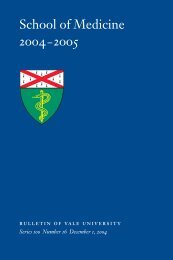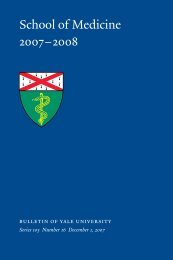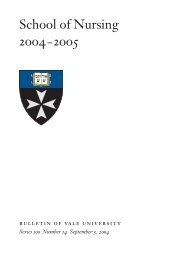bulletin 2002/nursing/pages.7 - Yale University
bulletin 2002/nursing/pages.7 - Yale University
bulletin 2002/nursing/pages.7 - Yale University
- No tags were found...
You also want an ePaper? Increase the reach of your titles
YUMPU automatically turns print PDFs into web optimized ePapers that Google loves.
Course Listings 97by the principles of general health screening, DSM IV, therapeutic interviewing, andcomprehensive history taking. A multi-explanation framework is used to conceptualizecase formulation and the examination of differential diagnoses. Health screening emphasizesrisks to the psychiatric population, and physical conditions and genetic backgroundin relation to mental health. Major components of mental health assessment are interviewingtechniques, mental status examinations, psychosocial developmental history,family history, and sociocultural influences. Specific evaluation techniques for substanceuse and abuse, sexual dysfunction, developmental stage, and risk for dangerousness areincluded. Required for all psychiatric–mental health <strong>nursing</strong> students in the first year ofspecialization. Open to others with permission of the instructor. Two hours per week.S. Talley.658b/c, Specialty Practicum in Psychiatric–Mental Health Nursing and PrimaryCare. 4 credit hours per term. This clinical course provides students with direct careexperience of individuals with serious and persistent mental illness (SPMI) and theopportunity to develop primary care skills and clinical judgement. The focus of thepracticum is on comprehensive assessment and management of adults with SPMI inacute and ambulatory psychiatric settings. Emphasis is on co-morbid conditions that areprevalent among individuals with SPMI and behaviors that may exacerbate those conditions.Preceptors provide individual supervision in the clinical setting. Clinical conferencesfocus on the process of clinical reasoning through the case presentation method,including formulation of clinical diagnoses, and discussion of management strategies.Professional role development of the advanced practice psychiatric nurse focuses on thenurse-patient relationship and the interaction of nurse, patient, and environmental factors.Required for all psychiatric nurse practitioner students in the first year of specialization.Twelve hours per week in spring term and a minimum of 180 total clinical hoursin summer term. S. Talley, coordinator.659a, Personality Theory and Adult Development. 1.5 credit hours. Biological, social,cultural, and psychological influences on personality and adult development areidentified. Theoretical perspectives for understanding personality and development inadulthood are surveyed in relation to clinical mental health practice. Biologic, social,psychodynamic, relational, existential, and cognitive perspectives are reviewed. Perspectivesare examined critically combining current and classic literature with an emphasis onintegration. This material is then used to explore the concept and phenomena of personalitydisorder and provides the background for the examination of psychiatric disorders,as identified in DSM IV and examined in 659b. Required for all psychiatric–mentalhealth <strong>nursing</strong> students in the first year of specialization. Open to others with permissionof the instructor. One and one-half hours per week. D. Olsen.659b, Psychopathology and Human Behavior. 2 credit hours. This course examinespsychopathology and the diagnosis of psychiatric disorders across the life span as guidedby DSM IV nosology. The examination integrates influences on personality and developmentincluding biologic, familial, social, and cultural factors. Theories of personality and




